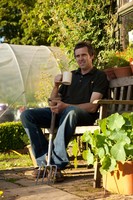Gardening 'makes children happy'

Multi award-winning garden designer Adam Frost has welcomed a Royal Horticultural Society study that suggests gardening makes children feel happy and teaches them valuable new skills.
The comprehensive new survey of 1,300 teachers and 10 schools across the country, commissioned by the RHS, reveals that children in schools which encouraged gardening became more resilient, confident and lived healthier lives.
Garden designer Adam Frost – a triple gold RHS Chelsea Flower Show medallist – agrees with the report’s findings that gardening should be used as a key teaching tool, rather than as an extra-curricular activity.
Adam, who lives in Stamford, Lincolnshire, said: “Children, particularly at a young age, have a love of learning. They enjoy getting their hands dirty, planting things and watching them grow.
“I believe that it is vitally important for schools to encourage children to adopt and embrace gardening – whether it be growing a sunflower in the classroom or encourage them to get involved in developing a school garden.
“By stimulating learning through gardening, children also engage in problem solving, become more questioning about the things around them, and appreciate outdoors spaces and living things.”
Dad-of-four Adam added: “Apart from all that, kids love getting their hands – and the rest of them – dirty in the garden! The new skills they can acquire through gardening are numerous.”
The research also showed:
- Children encouraged to get their hands dirty had a more active, inquisitive approach to learning.
- Promoting problem solving forced the children to think on their feet.
- Through the health living and healthy eating message, children said they would be more willing to try new vegetables if they had grown their own crops.
Promoting the message of ‘gardening for all', Adam already has a strong link with learning through gardening - championing the Government’s educational initiative, The Diploma.
The aim is that by 2011 a total of 17 subjects will be available for students aged between 14 and 19 - by way of a two-year course running alongside existing school or college studies.
As a mentor for the Land Based Diploma, Adam’s groundwork is well underway, having already lectured on the idea to teachers and students around the country.

